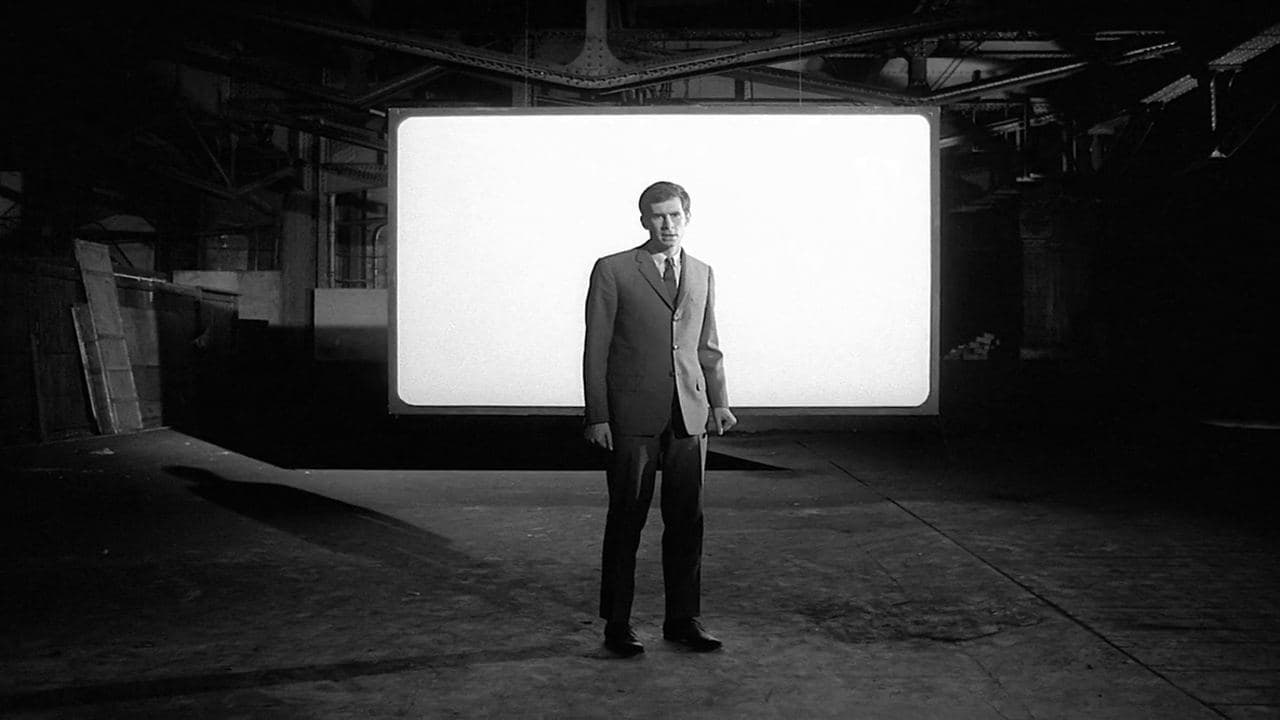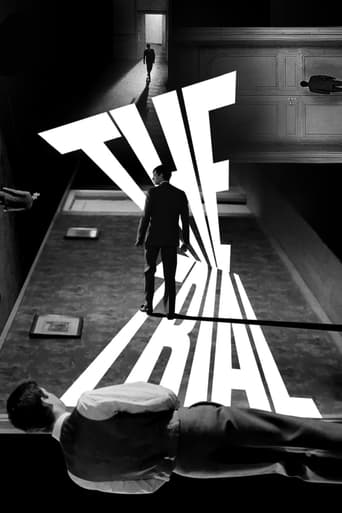

I think filming Franz Kafka is probably more difficult than filming Ernest Hemingway. Getting all the meaning out of Hemingway's sparse prose has certainly been a challenge. But with Kafka and The Trial, how do you film inside a man's mind in an unnamed existential world?Well Orson Welles certainly gave it a try. The first time I watched The Trial I started a few times and gave up. I was determined to see it through and did this time. I did see it through and came away still not sure of what I saw.Anthony Perkins is the protagonist Jozef K. He's a nameless toiler in what Kafka correctly sees as a future age of information. Had the film been done today you would see Perkins as a nameless drone chained to a computer. But he's done something that has whatever authority there is most upset. He's under arrest though for a moment free on some futuristic version of bail on an unnamed charge.Civil liberties have certainly gone out the window. Kafka was not writing about an Anglo-Saxon society where one's innocent until proved guilty. Guilty as charged with little or no chance of proving yourself innocent.I'm not sure Welles had any fixed notions about filming this in the way he firmly knew his mind with his other and better films. He was experimenting here with some stream of consciousness type technique and I think he was attempting the impossible. He wrote some interesting vignettes for people Jeanne Moreau, Romy Schneider, and Akim Tamiroff who offer varying degrees of sympathy for Perkins's plight, but all can really do nothing.The Trial is an interesting experiment, but it doesn't make it in my book.
... View MoreOne of the most artfully filmed movies - very much surreal. This is also one the best films roles for Anthony Perkins, he's perfectly and rightfully cast.Imagine waking up and the police are in your room, you are told you are under arrest - but not in the traditional sense of the words "under arrest". Imagine you are made to stand trial for and never knowing what the charges are against you. You have to defend yourself without knowing what you are defending yourself against. This has happened to Josef K. (Perkins) in this dramatically bizarre, twisted mystery-thriller.9/10
... View MoreThis film has a surrealistic language, a transcendentalist style, Wells' iconoplasticism, Kafka's philosophical anthropology, poetic imaging, and existentialist reflection.It is historically, culturally, politically and philosophically relevant.It is also relevant for cinematography studies (for its brilliant use of different lenses, lighting and composition of the shots), for actor directing studies (for the non naturalistic performances that make the film consistent) and film directing studies (for the non transparency of the style, representation and meaning).It should be in the top of the IMDb list so that everyone could know that they should absolutely see it as soon as possible.It is a remarkable achievement in film
... View More"Nowadays you can hardly say anything against Orson Welles without invoking scorn and ridicule," Kristl mused."You were going to?""Not on purpose, but I feel a bit apprehensive about it. I mean you have a certain amount of leeway towards almost any other director, except for Welles.. You have to say he was a great guy..""Pff.." Henry said."Yeah.""You do not have to, with me," Henry said."Thanks.""So, I think it is an old boring slow moving that is a bit confusing, to say the least," Henry said."You think so?""I mean, black and white in 1962," Henry said."Uh, well..is that such a big thing?""Yeah.. and no action.""Okay..I feel compelled to come to the defense of this movie."Henry smiled, but he hid his smile behind his hand and pretended to take sip from his tea, "Hot," he remarked."Regardless of anything it's at least a decent film, although it seems to be all over the place," Kristl said."It looks like someone pasted a lot of 'scenes' together without much sense and pawned it off as a coherent movie," Henry said."Really?""Yeah.""It seems to be quite true to the book.. which means that any coherence in the movie, or any incoherence for that matter, must stem from the book," Kristl said."Then the books must be a bit of a confusing mess," Henry said. "Maybe, but I liked the movie, you know. It was surreal, strange and unsettling. Which seems appropriate to me..""Right.""For the Kafka story that is.""Oh, did you read it by the way?""No," Kristl shook her head."Me neither.""I think that goes for most of the audience," Kristl said."Yeah. So how you know it is fitting?""Well, other people say so that it is. Except for the ending. Which was thought off by Orson Welles. He felt it to be more appropriate. It seem to have to do with the holocaust. I am not quite sure. Seems more that the end is fitting to a cold war.""Yeah. But anyway, too old a movie for me really," Henry said."I think it's a good movie, but not astounding. Perkins is such a dubious choice. At times he is really excellent, but at other times he seems to be a poor choice. He has these wild mood swings. He constantly hovers between assertive and dejected. It's just odd how he swings from one attitude to the opposite.""Heh.""And there seems to be no development in his character. He just seems to go from one mood to the other depending on what is fitting for the scene at the moment. So there seems to be no humanit that drives him, just like: in this scene he should be angry and in this scene he should be desperate.""Ah.""It is just a bit to fabricated. A very nice fabrication, but a fabrication nevertheless.""Like most movies.""Yup. Did you know someone made a sequel to the trial?""Yes I did. Will Eisner made one called the Appeal. In it justice is done.""Oh you know..""Hey it's a comic. It was Eisner responding to Kafka. While Kafka painted a surreal world in which a man was the victim of soulless bureaucracy, Eisner seems to say that in a democratic society 'they' would not get away with it in the end.""Maybe someone should make a movie about that?" Henry said."Maybe someone will."www.meritcoba.com
... View More